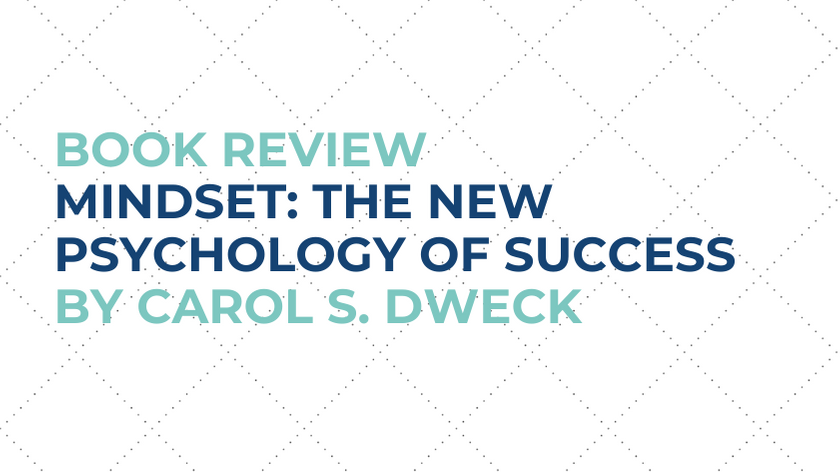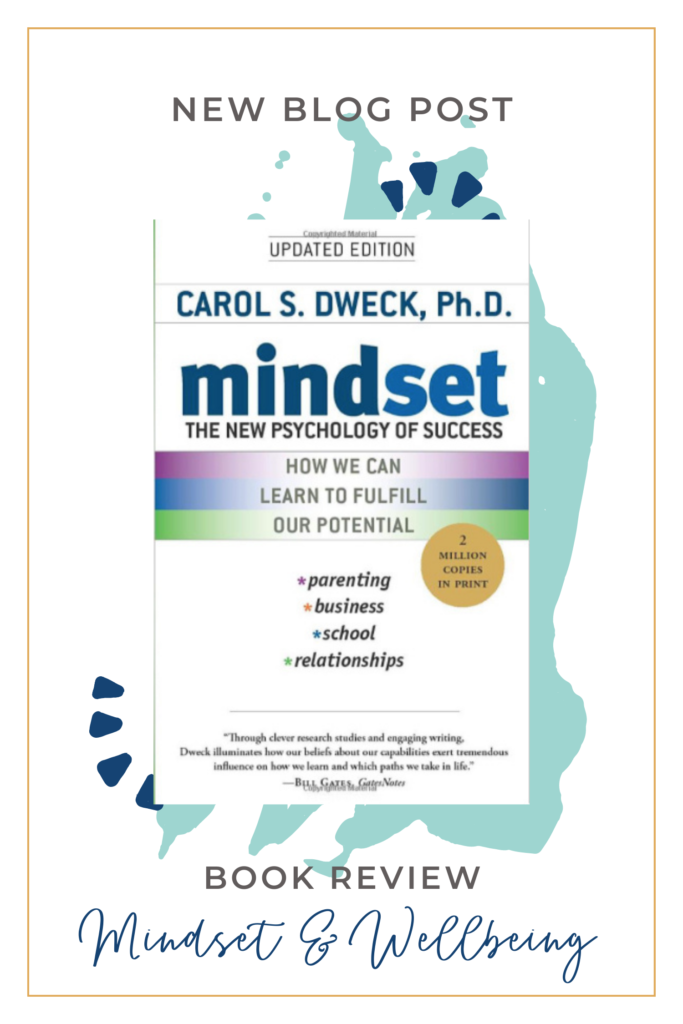
It’s a myth!
Your brain isn’t hardwired and you can train it to do whatever it is you like, whenever you like.
All you need is to be open to embracing discomfort if you want to succeed.
So, with that said, even if you aren’t into learning and studying about mindset and people’s attitudes and why they react the way they do, you’ll find the various concepts addressed in this book extremely fascinating.
Here’s a quick review of the book by Carol S. Dweck, which was really eye-opening and insightful and it talks about how people react to certain situations depending on their mindset.
The book is called Mindset: The New Psychology of Success.
I read this book a few months ago, but I felt it was important to spread the word about this book right now.
It’s all about knowing how to deal with tough situations, and succeeding despite challenges, when you think a certain way.
Therefore, it would be a great way to navigate the situation we are faced with in the world right now, right?
And also, this is a great book to read if you have kids because I wished I’d read this decade ago, especially as a single mother in a foreign land and with little support.
Regardless of whether you have kids, it’s really a fantastic resource.
How Is Growth Mindset Different from a Fixed Mindset?
This book is all about differentiating between a growth and a fixed mindset, through extensive and mind-boggling research done by Carol Dweck.
She has conducted many different studies on the two different mindsets, and she concluded that someone either has a growth mindset or they have a fixed mindset.
What she found was that people who had what she defined as a growth mindset, were willing to depend on their intelligence and they defined intelligence as something that improves over a period of time – in other words, it isn’t fixed.
However, people with a fixed mindset obviously didn’t believe that intelligence was something that grew with time. And naturally, it meant that it was fixed.
Fixed Mindset and Four-Year Olds
The intriguing thing, though, is that during a study she found that kids who are even as young as four years old have already developed one of the two mindsets.
She conducted a research study in which she had two groups of kids who were given a jigsaw puzzle. These kids were just four years old.
These groups were, of course, based on the type of mindset they had.
The kids who had a fixed mindset were offered an option to either work through a simple jigsaw puzzle and do it over and over again once they finished solving it the first time, or to get a harder one.
What was remarkable was that even at merely four years old, the kids with the fixed mindset said they much rather not do something that would make them look stupid.
So, they chose to stay with the simpler puzzle, which is phenomenal when you think about it because even at four years old, they already had a predominant mindset and didn’t want to look bad.
That wasn’t, of course, the case with the other group that wanted to solve harder puzzles.
So, that was one study.
Fixed Mindset and School Kids
A similar study was done with kids who were a little bit older but had a growth mindset. One of the kids said that at school, even if they didn’t know the answer to a question that the teacher asked them in class, they still liked to raise their hands because they felt that they would learn from their mistakes if their answer was wrong.
That is the basic differentiation between the growth mindset and fixed mindset. And, in this book, Carol Dweck also recounts some other studies she has conducted.
She mentions a specific study where she intentionally put students into a fixed mindset. So, yes, it was done on purpose.
The students were praised for their intelligence over and over again at the outset of the study. No matter how easy the exam was, whatever test they were administered, they were continually praised for their intelligence.
But once the tests became harder and harder, they didn’t even want to attempt the test any longer because they felt that if they fared badly in the test, they would look stupid and they would be judged as such.
So, that was a great example of how you can create a fixed mindset in kids by repeating a behaviour over and over again.
Being in the fixed mindset these kids just didn’t want to take a chance with the harder tests. In case they didn’t score well, they would end up looking stupid.
Michael Jordan Has a Growth Mindset
Then she talks about champion athletes, and she talks specifically talks about Michael Jordan, who hadn’t made the cut right at the start of his career with his varsity team.
He hadn’t performed well and naturally he wasn’t selected and which quite understandably devastated him.
But his mom suggested that he should go and get more disciplined if he wanted to be on the team the following year, and that’s exactly what Michael Jordan did.
He would practice for hours, and his coach was really surprised that he was doing that after not making the team. When his coach asked him why he was working so hard, he said that he was preparing for the next year!
He was already preparing in advance for his games for the following year!
But then, on the other hand, there was John McEnroe, the tennis player, who retired early.
He used to get really frustrated when his games didn’t go well and he enjoyed them less and less towards the end of his career.
Carol Dweck’s studies showed that the reason that had happened was that he had a fixed mindset and therefore, he didn’t want to look bad. And this was shared by McEnroe himself.
Mindset in Love Relationships
Further, Dweck talks about mindsets in relationships and in love, and she concluded that when people with the fixed mindset somehow found themselves in a broken relationship because their partner left them, they tended to feel judged and labeled.
But she found the people in the growth mindset to be more forgiving, and they actually spent time on self-awareness and reflection and tried to move on.
So that was a pretty interesting thing for me to learn about.
Mindset and Parenting
Next, Carol Dweck talks about the two mindsets in the context of parenting.
She noticed that parents tried to discipline their kids, and try to encourage them to do different things. This is natural and something that all parents do.
However, sometimes those techniques they used weren’t the best.
Obviously, they’re doing their best for their kids, hoping that it would help and they were only trying to help develop their children’s abilities.
But Carol Dweck found that these techniques were actually having the opposite effect. They were trying to use techniques and strategies that were just wrong, and they would boomerang.
And it really didn’t help the kids because they ended up feeling judged and they become resentful which of course doesn’t help them.
So in the end, if you are a parent, and you are trying to help your kids develop, I think this book would probably help you understand and differentiate between the growth mindset and the fixed mindset because over time a fixed mindset could evolve into a growth mindset.
I wish I had read this book some 20 years ago – I would have been a much better single parent and my son would have possibly grown up less insecure.
And while on the topic of parenting, I’d found another book that was an incredible resource when my son was growing up.
Conclusion
Personally, I think this was a very, very interesting read, I highly recommend it.
As a coach, it was very helpful because it helped me understand the patterns in which people think and that helps me in supporting my clients.
But I believe that even if you aren’t a parent, nor a coach, it doesn’t matter. This book is great for anyone.
It’s just a basic understanding of human psychology. And, of course, you know how people react to certain situations and how they either stay stuck or they use it for leverage. Right?
So anyhow, I found the concept really fascinating and I do hope you pick up the book and you get a chance to read it.
I would love to hear from you to know what you thought about the book.



Recent Comments